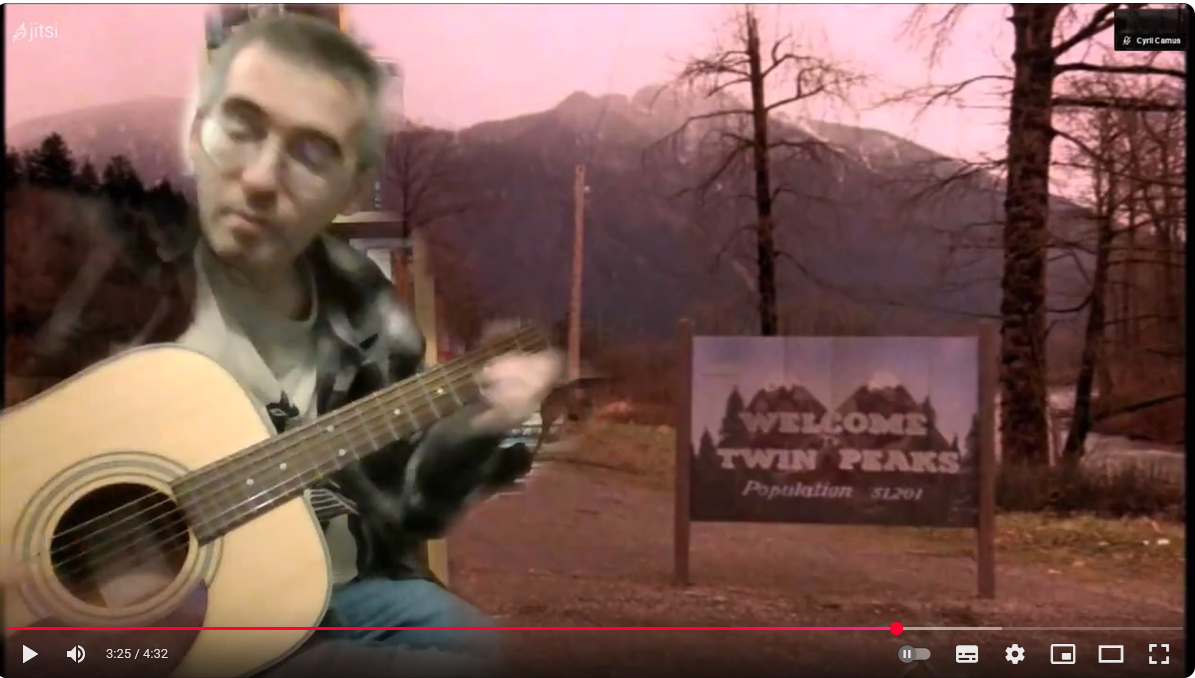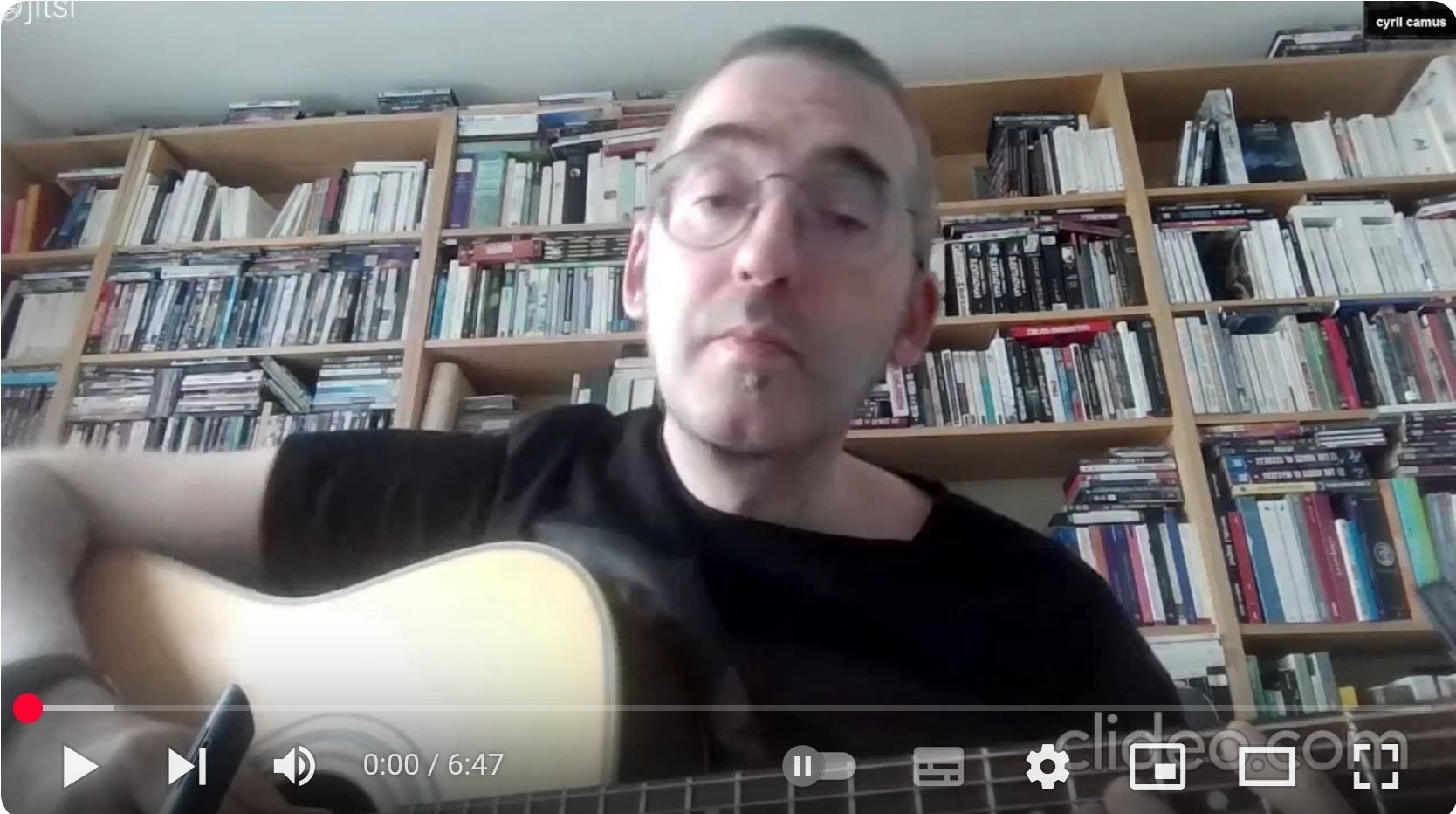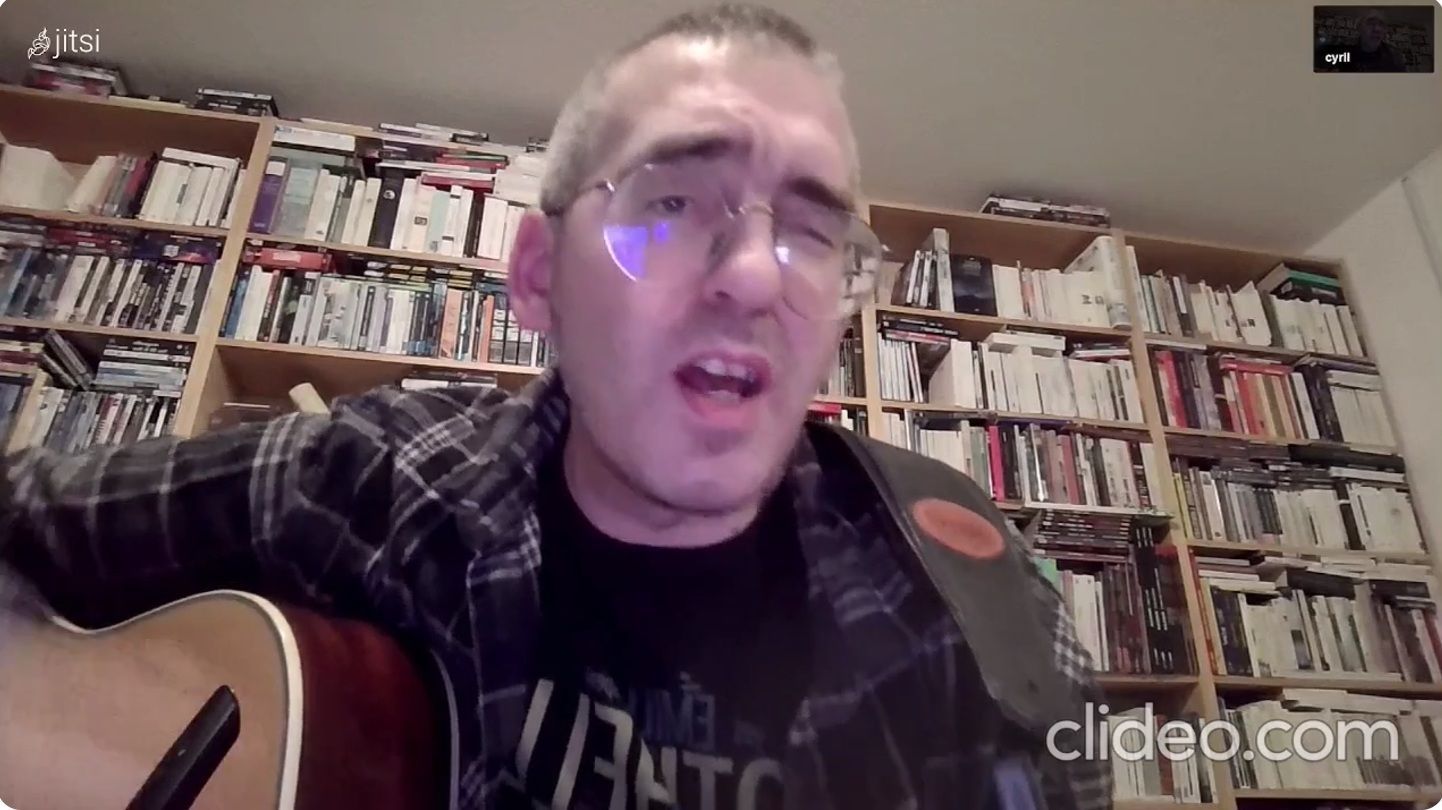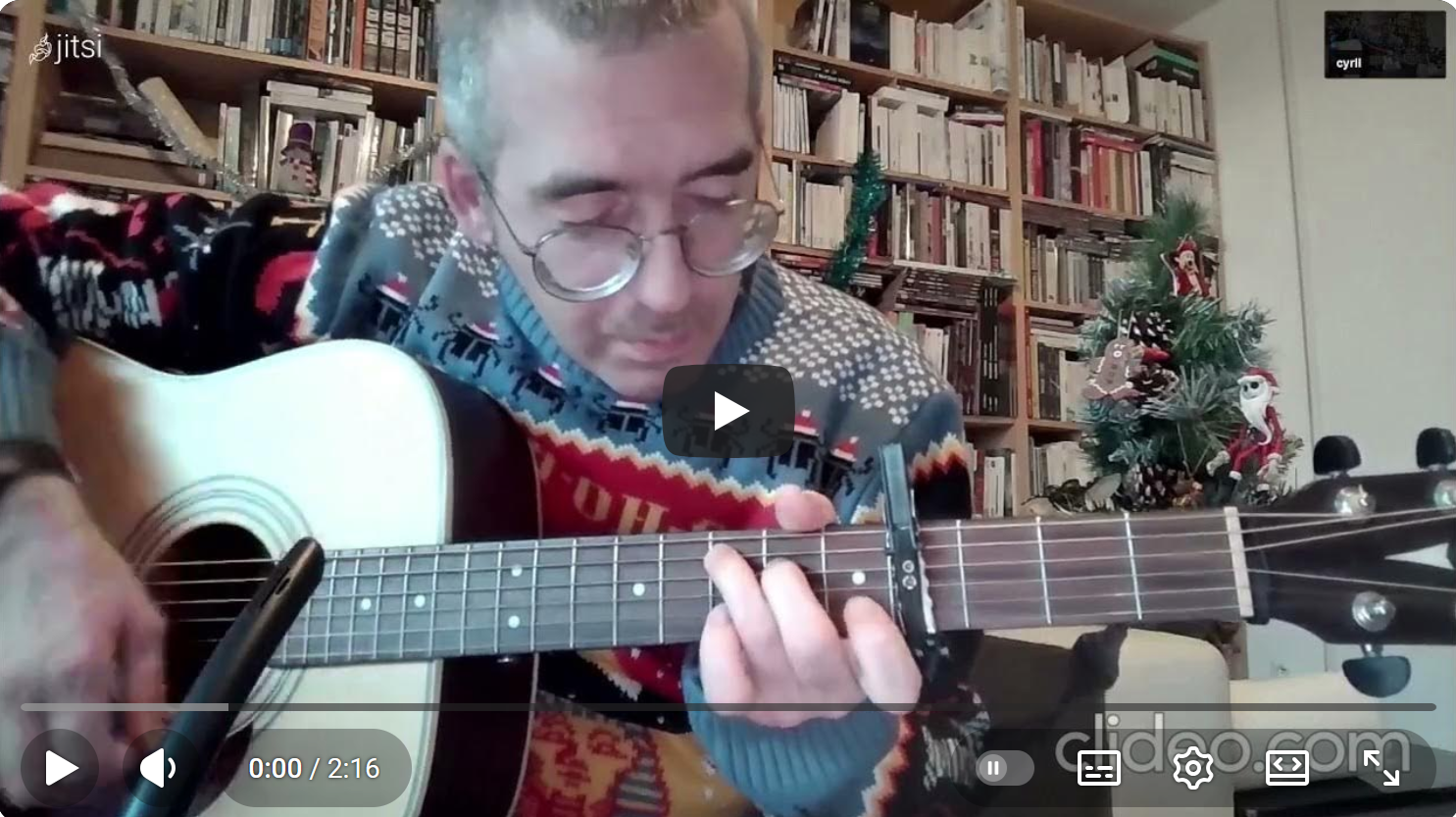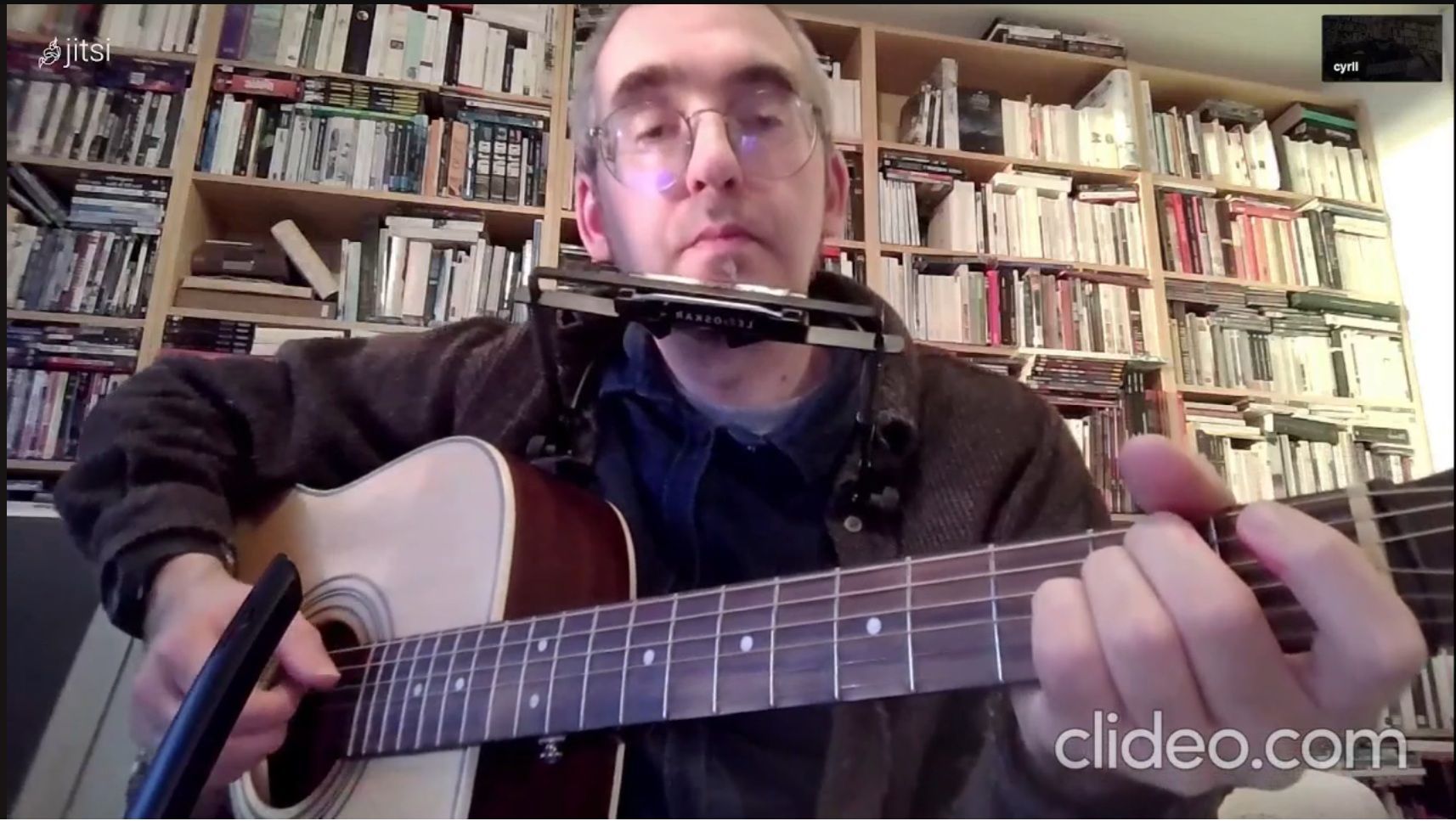At Christmas 2024, I was offered a new guitar and new harmonicas, replacing those that a fire and smoke getting everywhere in my apartment had rendered unsanitary in October 2022. After many years of making little music due to lack of time, and over two years of not making music at all due to lack of usable instruments, I have now resolved to force myself to find the time, so I make Youtube videos to motivate myself.
4 January, 2025
First new song learned on my new instruments brought by Santa (at Christmas 2024, of course).
Lyrics and music by English folk singer Graham Moore (1995).
But my main reference, personally, is the English-Welsh folk band The Trials of Cato's version (2018)
(I wrote about them in this musical stroll).
8 January 2025
1. God Rest Ye Merry Gentlemen (traditional) 0:00
2. Bells Over Belfast (The Irish Rovers) 2:59
3. It's a Terrifier Christmas (Dave Eggar, Jon and Al Kaplan) 6:50
Many people have played "God Rest Ye Merry Gentlemen", which is an English traditional Christmas carol, listed as n°394 in the Roud Folk Song Index (thanks Wikipedia for the info), but here are my main personal references as far as this song is concerned: Nat King Cole's version (1960); The Chieftains' version (1991); The Irish Rovers' version (1999); and the version by Dave Eggar, Quilted Lunchbox and Teni Rane from the EP Blood Before Pride Presents: Tidings of Macabre Joy (2024), which is also featured in Damien Leone's movie Terrifier 3 (2024).
"Bells Over Belfast" comes from the album Songs of Christmas (1999) by the Irish Celtic folk band The Irish Rovers.
"It's a Terrifier Christmas" is a funny, Art the Clown-themed fake Christmas carol, by Dave Eggar, Jon and Al Kaplan, which is part of the soundtrack of Damien Leone's movie Terrifier 3 (2024).
The font for the titles is Lucida Handwriting (© 1991 Bigelow & Holmes Inc.).
11 January 2025. When you like folk songs, Christmas carols, funny songs AND horror movies...
The first one is "It's a Terrifier Christmas", a funny, Art the Clown-themed fake Christmas carol, by Dave Eggar & Jon & Al Kaplan, which is part of the soundtrack of Damien Leone's movie Terrifier 3 (2024).
The second one is "The Clown Café", de Jon & Al Kaplan — the folksy happy fake-ad song Leah Voysey performs in the nightmare scene in Damien Leone's movie Terrifier 2 (2022).
The first image is from my Christmas tree.
The second one is art (or, literally, "Art") by Em1rc4n (Deviant Art).
The font for the titles is "Massacre", by Norfok Incredible Font Design.
31 January 2025
My posthumous tribute to the recently departed David Lynch, in the form of an adaptation (into my kind of mindless strumming) of Angelo Badalamenti's haunting opening credits theme (1989) to Lynch's dazzling TV series "Twin Peaks" (1990-1991, 2017).
Thanks to two much more talented tutorialists out of whose examples I whipped up that thing, like Adriano Tarullo and particularly Romain CNC.
17 March 2025
Original lyrics by Irish author, songwriter and publican Cathal McGarvey (1866-1927) at an unclear date.
The music is that of the English traditional folk song "Dives and Lazarus" (number 477 in the Roud Folk Song Index), and it was recycled by some Irish folk singers as the background music both to the ballad "My Love Nell" and to "The Star of the County Down".
The first version of this song I've ever heard is that of Fair Isle Folk (1985), on a compilation of "Irish Pub Songs". Since then, though, I've been particularly thrilled by the live version of French Celtic folk band Tonynara (1999). But obviously the classic versions of The Chieftains (1988) or The Irish Rovers (1996), or the punk-ish version of The Pogues (2005) are all very important and striking iterations of the song.
More on the lyricist, McGarvey, and the history of the song, in note of 13 of this musical stroll.
27 March 2025
Obviously, lyrics byPaul Simon, music by Paul Simon and Art Garfunkel (1964). The cover is dedicated to Maëlle Tessier, who "commissioned" the video.
31 March 2025
The actual original version (or the "original original") of this song was created by Tears for Fears (1982), with words and music by the lead singer and lead guitar player Roland Orzabal, but sung by bassist Curt Smith.
However, I really don't like this version at all.
The song was covered in 2001, as part of the brilliant, eerie original soundtrack for the brilliant, eerie movie "Donnie Darko", with vocals by Gary Jules, while the music was arranged and is performed by Michael Andrews (who also created the rest of the movie's score). I feel like these two guys took a lackluster song by a band I admittedly don't care much for, and changed it into a magnificent piece of heartbreaking perfection.
Obviously, it's the Jules/Andrews cover, rather than the Tears for Fears original, that inspired me to learn this song.
4 April 2025
My favourite song by Bob Dylan (with a bit of a borrowing from the traditional Scottish ballad "Mary Hamilton" (Roud Folk Song Index 79) for the melody of the chorus), from his 1964 album The Times They Are A-Changin'.
A beautiful, tragic indictment of the horrors of segregation as well as the privileges of rich, connected criminals (and not much has changed in that regard, don't you think, Donald? Elon?).
The Dylan portrait in the background is a replica, by my good friend Maryse Bellenger, of Malika Favre's New Yorker cover for 13 October, 2016 (the day when Dylan got the Nobel Prize for Literature).
And my Dylan Dog T-shirt is no more than a fortunate coincidence.
10 April 2025
I'm not particularly a fan of the Rolling Stones, generally speaking, but that specific song (1966; lyrics and music by Mick Jagger and Keith Richards), I fucking looooooove it.
Here's also a fun parody, which I love too.
Here's a little tune specially for you on your special day! 😉
Also, it's supposed to be a mixture of a melody for a song called "Good Morning to All" (1893) by Patty and Mildred Hill, and lyrics that were then put to it at an indeterminate time, but the first actual copyright registration was made in 1935 and credited Preston Ware Orem and Mrs. R. R. Forman for the lyrics.
18 April 2025
Lyrics by Arthur Freed and music by Nacio Herb Brown. Initially introduced on Broadway by Doris Eaton Travis in The Hollywood Music Box Revue (1929), then widely popularized by Cliff Edwards and the Brox Sisters in The Hollywood Revue of 1929, then played for years by many different artists — but of course the most famous version is the performance by Gene Kelly in the movie Singin' in the Rain (1952), directed by Kelly himself and Stanley Donen (and produced by Arthur Freed, the guy who wrote the song's lyrics initially. We've come full circle).
20 April 2025
It's not St Patrick's Day, but it's Easter, and for those who are interested in Irish culture, Easter means Easter Rising (the 1916 insurrection that was among the first events in the revolutionary shift leading to the Irish War of Independence), and Easter Rising means "The Foggy Dew", the famous song that recounts the insurrection.
The song was written in 1919 by an Irish priest named Charles O'Neill, in a part of the country that was later to become Northern Ireland. The melody is borrowed from another, older Irish traditional song entitled "The Moorlough Shore" (Roud Folk Song Index 2742). One of the most famous late 20th century performances of "The Foggy Dew" is probably the 1995
Chieftains/Sinéad O'Connor collaboration (on the Chieftains album
The Long Black Veil), and the good ol'
Dubliners obviously killed it, when they did that song, but I'm particularly fond of two French versions, Gilles Servat's collaboration with The Dubliners' Ronnie Drew Servat's 1996 album
Sur les quais de Dublin, and the version by
Tonynara, from their 1992 album
Vagabondages.
24 April 2025
I have happily received in the mail my DVD of Takashi Yamazaki's excellent movie Godzilla Minus One (2023), and so, as a tribute to the King of Monsters, to the fountain of joy first unleashed in 1954 by Ishirō Honda and Shigeru Kayama, I give you my "unplugged" version of the Godzilla-themed song "Trampling Tokyo" (1994), written by Alan Moore (the comics writer and novelist who wrote Swamp Thing, Watchmen, the 1980s reboot of Marvelman, From Hell, Halo Jones, The League of Extraordinary Gentlemen, Lost Girls, Voice of the Fire, Neonomicon, Jerusalem, The Great When and countless other formidable works), with music by Patrick Huntrods, aka Pat Fish (aka the Jazz Butcher).
The lyrics were initially published (with illustrations by Arthur Adams) in the anthology comic book series issue Negative Burn #18 (1994) and the song was recorded in 1993 with Alan Moore singing, Pat Fish singing along and playing the guitar and the organ — but it was only released in 2011, as part of a CD compilation of Alan Moore's songs, sold along with Gary Spencer Millidge's biographical book Alan Moore: Storyteller.
I don't know if the guitar chords I'm using are the right ones. I deduced them from the melody. Likewise, my harmonica ramblings are a very approximate approximation to what Pat Fish does with the organ in the original recording. Hope this is all enjoyable enough.
The background to the video is beautiful
fan art by Noger Chen, inspired by Hideaki Anno and Shinji Higuchi's magnificent movie
Shin Godzilla (2016).
4 May 2025
Challenge: singing in a language I do not know at all. Hope the result is not too shitty (or the idea too cringey), but I really love the song (and the movies it is attached to).
So here's "Urami Bushi", the song performed by actress Meiko Kaji for the soundtrack of Shunya Itō's movie Female Prisoner #701: Scorpion (女囚701号/さそり, Joshū Nana-maru-ichi Gō / Sasori) (1972), in which she starred, and the movie's sequels, in which she starred too.
The lyrics were written by the director, Shunya Itō, and the music is by the soundtrack's composer, Shunsuke Kikuchi.
(You may also know it because it is featured, as a tribute to the Scorpion movies, in the end credits of Quentin Tarantino's Kill Bill, vol. 2 (2004).)
17 May 2025
Lyrics by Renaud Séchan. Music by Franck Langolff. The song dates back to 1988 (it was on the album Putain de camion), but it could have been written yesterday, as, 37 years later, absolutely nothing has changed, or if it has it's for the worse.
22 May 2025
A song that is cool on two counts:
- first, it's a song originally released by Nine Inch Nails, on their 1994 album The Downward Spiral, and it's one of this excellent industrial rock band's masterpieces
- and, secondly, in 2002, the legendary Johnny Cash covered it for his last album before passing away, American IV: The Man Comes Around, and his unplugged, heartfelt folk version is so breathtakingly moving that it instantly became his testament song
25 May 2025
his cover, dedicated to my mom on this Mother's Day, is of an old American song, written and composed by late 19th/early 20th century Irish American songwriter
James Thornton, and
recorded for the first time in 1903, by popular musical entertainers
Byron G. Harlan and
Frank C. Stanley.
I haven't found out about it through this early recording, however, but through the recording by the legendaryJohnny Cash, which is part of the 2006 posthumous collection Personal File, which contains previously unreleased intimate recordings, dating back to 1973 for most of them, and found in his personal files after his death.
28 May 2025
Bubba Ho-Tep (2002), by Don Coscarelli, is a great movie. It's a comedy horror movie, but not very deep underneath this veneer of comedy horror, it's actually a very touching, bittersweet story about old age, the whole experience is carried all throughout by a poetic tone of deep nostalgia towards some of the touchstones and legends of the history of US culture, and all of this is in the service of the pleasantly bonkers story of an aging professional Elvis lookalike who thinks he's the real Elvis (or is he, maybe, the real Elvis?), making friends in a Texas-located private old people's home with a old African American paraplegic who absurdly claims (or is he, perhaps, revealing the truth?) that he is the late president John F. Kennedy, whose death was faked and whose skin was dyed so that Lyndon Johnson could replace him, and Elvis (played by Bruce Campbell) and JFK (played by Ossie Davis) have to fight an Egyptian mummy that is on the loose and killing the home's residents every night by eating their elderly souls.
The novella on which it is based is also quite great. It is also entitled "Bubba Ho-Tep" (1994), it was written by Texan horror-fantasy-western-crime (I'd argue, neo-pulp) writer Joe R. Lansdale, and it is available in his short story collection Writer of the Purple Rage (1994).
The film's soundtrack, by Brian Tyler, revolves around a recurring theme that is well summarized in this track.
My favourite iteration of the theme, in the whole soundtrack, is the wonderful track called "The King's Highway".
In the video above, I'm basically just playing the main theme of Bubba Ho-Tep with a few bits of impro now and then. It's just a small love letter to that movie and its music.
17 June 2025
On the occasion of the publication of my article "Aux sources de la chanson réaliste folk punk de François Hadji-Lazaro : échos d’Irlande, d’Écosse et d’Amérique", published in the music section of the
Ariel's Corner column of the online English-language studies journal
Miranda, I am posting here my little covers of two songs by François Hadji-Lazaro's band called Pigalle.
0:00 Dans la salle du bar-tabac de la rue des Martyrs
3:24 L'Éboueur
The first one, "Dans la salle du bar-tabac de la rue des Martyrs", was initially released in 1990 on the Pigalle album
Regards affligés sur la morne et pitoyable existence de Benjamin Tremblay, personnage falot mais ô combien attachant.
The second one, "L'Éboueur", was first
released in a low-tech version on the compilation
Mon grand-frère est un rockeur (1987), then reissued in a
more energetic form, recorded live, on the album
Pigallive
(1992), a version I greatly prefer.
The first title screen is illustrated by a
photo entitled "François Hadji-Lazaro en 1989 à la fête de l'Huma" and uploaded to Wikimedia Commons by a user called Mouliric.
The second title screen is illustrated by a photo entitled "Pigalle (groupe) lors de Un été dans l'Aisne 2015 à Laon." and uploaded to Wikimedia Commons by a user called G. Garitan.
26 June 2025
Hey, more or less in holiday, so, to celebrate, here's the punchiest song I know by the fella who was once christened Robert Allen Zimmerman, but whom you may know better as Bob Dylan. 😉 And the song is "Like a Rolling Stone", from his magnificent 1965 album Highway 61 Revisited.
27 June 2025
We are now entering a period of the year in which, most of the time, this song is the most appropriate one to sing.
It's a song by US singer-songwriter and Tai chi teacher Gene Burnett, from his 2014 album
Double Hitters.
Here's the original one; here's also Burnett explaining how to play the song (and yes, my cover is a considerably simplified version, because I'm a lazy bum).
Finally, here's the guy's
homepage, and the
list of his albums.
29 June 2025
A bit of finger-picking, even though I know I'll never be able to do it properly — just because these days I've been listening a lot to Muireann Bradley and she's great and I'm a bit envious (you should listen to her too).
It's obviously a song by Bob Dylan, from his 1962 album The Freewheelin' Bob Dylan.
Oh, and of course, Muireann Bradley does it much better than me.
1st July 2025
It's punk time! — with "Demain il pleut", a song by Guerilla Poubelle, from their 2005 album Il faut repeindre le monde... en noir ...
... and these days, when you read the title of the song, you think to yourself: "if only that were true..."
4 July 2025
Another great song by Tom Waits, from his 2006 album Orphans: Brawlers, Bawlers and Bastards.
28 July 2025
Traditional folk song (Roud Folk Song Index 6364) thought to have originated among prisoners in the American South.
The song was first commercially recorded in 1926 by Dave "Pistol Pete" Cutrell, a member of McGinty's Oklahoma Cow Boy Band.
It's probably best known through the 1934 version recorded by the bluesman Huddie Ledbetter (a.k.a. Leadbelly).
My favourite version, however, is the great Odetta's, recorded in 1964.
31 July 2025
After the Japanese film song "Urami Bushi", I'm trying again to sing in a language I can't speak or fully understand, humiliating myself again for love of cinema.
This one was written (and originally sung) by Italian singer
Elisa Toffoli, with music by
Ennio Morricone, for the soundtrack of
Quentin Tarantino's 2013 movie
Django Unchained.
And perdonami for the moments when I glitch.
2 August 2025
Song by Johnny Cash (based on material composed by Gordon Jenkin). It was written in 1953, first recorded and released as a single in 1955, included in Cash's 1957 debut album Johnny Cash with His Hot and Blue Guitar!, but the version I know is the live recording he made in front of inmates at Folsom Prison, in 1968.
4 August 2025
Dedicated to a very dear friend of mine, here is a cover of a song by Will Oldham, a.k.a. Bonnie "Prince" Billy, from his 1999 album of the same name.
Actually it's my favourite song of Oldham's, and the one through which I found him out, after hearing the cover by Johnny Cash, which he sings as a duet with Oldham on Cash's 2000 album American III: Solitary Man".
12 September 2025
Song byGeorges Brassens, released in 1953 by Polydor as part of a 78s phonograph record entitled
Georges Brassens - 2.
The lyrics are actually a few stanzas from the poem "L'Amour marin", by Paul Fort, published in 1900 in the first part of volume 2 ("L'amour et l'aventure") of his
Ballades françaises.
20 October 2025
A 1976 rock song by the American band Blue Öyster Cult, but, mostly, a song featured in the soundtracks of about 90 000 horror movies and supernatural thrillers, so definitely Cyril-friendly even though I'm not particularly into the rest of the band's output.
31 October 2025
The first two verses and chorus of the famous theme song from Ivan Reitman's famous 1984 movie of the same name. Original song by Ray Parker Jr.
15 November 2025
Super cool song by the
Doors, from their album
Strange Days
(1967).
4 December 2025
My favourite
song so far by the new folk great Jesse Welles — from his
2025 album
Devil's Den (Granted, it's a lot of Biblical craziness, but that often makes for cool imagery, and the tune is super catchy too.)
10 December 2025
Excellent
song by the no less excellent Hubert-Félix Thiéfaine, from his 2011 album
Suppléments de mensonge.
18 December 2025
A famous Christmas song (although it was not written as such and doesn't mention Christmas at all: it's just a song about winter cold, written by lyricist
Sammy Cahn and composer Jule Styne during a heatwave in California in July 1945, in order to pleasantly daydream about cooler weather).
The first recording was
Vaughn Monroe's, released just after Thanksgiving 1945 (and yes, that original version is the one featured in John McTiernan's 1988 film
Die Hard).
There were plenty of other versions, including Sinatra's (1950) and Dean Martin's (1959), but, as is often the case, I'd argue
Ella Fitzgerald's version
(1960) particularly rules.
20 December 2025
That one's a real old folk Christmas carol, with the melody borrowed from the Welsh winter carol "Nos Galan" and the English lyrics written by 17th-century Scottish musician Thomas Oliphant and first published in 1862 in John Thomas's Welsh Melodies, vol. 2. The most famous version (and, as it happens, a truly great one) is Nat King Cole's (1961), although Bing Crosby's (1957) is ok too, and so is Dave Eggar et V Covello's 2024 version for the soundtrack of the movie Terrifier 3, but Nat King Cole's definitely has something more to it than the others.
22 December 2025
A humorous Christmas song written by American singer-songwriter
Randy Brooks in 1977, then first performed and made famous in 1979 by the couple and country duo
Elmo Shropshire and Patsy Trigg, a.k.a. Elmo & Patsy.
The version I first heard, though, and clearly the best of the three, is Celtic folk band
The Irish Rovers' cover, from their 1999 album
Songs of Christmas.
24 December 2025
Now that it's Christmas Eve, here's my cover of the best Christmas song ever,
Weird Al Yankovic's "Christmas at Ground Zero", from his 1986 album
Polka Party! — a song whose nuclear-apocalyptic themes also happen to have been topical at the time (as it was still Cold War-era) but have miraculously become topical again nowadays, thanks to a certain repulsive goblin Krampus monster named Vladimir Putin!
Also, although the original song is a parody of some sort of slightly retro, bubbly and glitzy mainstream pop-rock (from what I've read, the kind of modern Christmas songs Phil Spector was regularly producing in those days), my version is
ska, just because I felt like it.
So, merry Christmas!
25 December 2025
And since now it's Christmas Day, here's a last one.
Originally a famous 19th-century poem entitled "A Visit from St Nicholas" (and whose authorship is contested, so it's either by Clement Clarke Moore or by Henry Livingston Jr), it was set to music and performed by many different people, but my reference (both for the selection of lyrics and the melody) is the
1952 version performed in a duet by
Gene Autry and
Rosemary Clooney.
1 January 2026
As 2026 blows up in our face, here's the only song referencing New Year's Day I could think of, which is also one of the few nice songs by Irish pop rock band U2, from their 1983 album War.
It was a song of hope, about Poland's Solidarność movement: let's hope that, contrary to what has been customary in recent years, the new year won't be an unmitigated hellscape. (Hard to believe, but still.)
15 January 2026
A song by the British punk band Chubawamba, from their 1994 album Showbusiness! Inspired by the horror of witnessing Neo-Nazi and Fascist groups marching across Europe and the UK to commemorate Rudolph Hess shortly after his suicide on August 17, 1987. May the blessed day evoked in the final line of the song come soon, especially with the extra nuisance we're putting up with today, of having fascist scumbags governing the USA, and close to coming to power in France and the UK.
24 January 2026
Another
cool song by the Doors, this time from their debut album,
The Doors
(1967).
29 January 2026
I've never been as big a fan of
Bruce Springsteen
as I have been of other rock & folk legends like Bob Dylan or Tom Waits, but
this song, which Springsteen released just yesterday (January 28, 2026), certainly struck a chord. Probably because for once he and I share the experience of watching the horror the song is about unfold (albeit from afar). And, obviously, just because it's really good, certainly, too, and fitting, and important. It actually feels historic, when you listen to it (just as the events unfortunately do too).
So for all those reasons, I felt like adding it here. You'll probably notice I haven't spent the time necessary trying to get every complex part of the tune right, and I haven't checked if my little kind-of improvised harmonica part even remotely resembles the one in the original, but, as with Springsteen's own release, this smaller-scale contribution felt like it was about the urgency of the moment. A cover dedicated by a horrified French ally to all the brave people in America who resist Trump's fascism.
Oh, and if you're very much in the mood for protest songs against the ICE criminals and about the Minneapolis heroes and martyrs, there are also
this one and
that one, and they're also pretty great.





